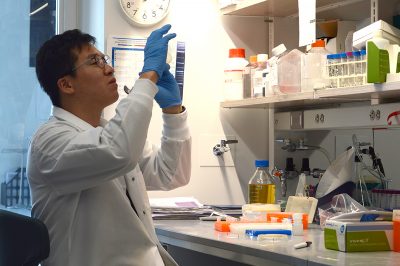The transition from traditional classrooms to online learning has given students and faculty an unprecedented new challenge. No shift comes without a bumpy transition, and science classes at Boston University have struggled without in-person labs, experiential learning and hands-on activities.

While remote learning is not ideal, professors and students said they have been making the most of it. Peter Buston, an associate professor of biology at BU, said the transition in his current theoretical evolutionary ecology course has been successful despite the expected adjustment period.
“The students, and the [teaching fellow] and I have done the best job we can to keep things as seamless as possible and make the transition as smooth and easy as possible,” Buston said. “It’s just required a little bit of patience on everybody’s part, but it seems to have, from my perspective, gone as well as, if not better, than we could have possibly hoped.”
While some courses typically involve more hands-on labs, Buston said his transition has been much smoother because his labs are computer-based. His course involves computer programs such as MATLAB, which students can download through the university.
“We’re fortunate in [that] the course is being relatively unaffected, because it’s a theory course, it’s a computer lab,” Buston said. “Many, if not all, the students had MATLAB installed on their computer… so, I think compared to some of the wet labs, we were relatively lightly impacted — it was a course that’s quite conducive to being done remotely.”
Avery Ofoje, a senior in the College of Arts and Sciences, is currently taking an ecology course. She said professors in her weekly lab, which is not computer-based, have found creative ways to recreate the course structure. But she said she isn’t gaining as much as she would have in person because of how the classes are supposed to be taught.
“There’s the doubt that we’re really getting the full experience, because how can we be if the entire course is designed for in-person meeting?” Ofoje said. “The format’s different [and] the material’s the same, but as far as the procedures and that experience with being hands-on with it, that’s totally gone.”
Ofoje also said her professor has been making lectures accessible for each student regardless of timezone. However, she said learning remotely does not come without challenges, testing being one of them.
“As far as the lecture is concerned, things have been pretty straightforward,” Ofjoe said. “We had to work with the logistics [of testing] online, and it’s hard to get in the right mindset to sit down and really focus for an hour.”
This adjustment for STEM courses on campus has more negatively affected other students, including College of Engineering junior Hans Walker, who said some of his design-intensive labs have been less helpful than he thinks they would have been in-person.
“There are a lot of labs for casting work, which is key in a lot of mechanical engineering positions, stuff like quality assurance or design projects, which are meant to be preparations for the real world and various other classes,” Walker said. “I am definitely not getting enough out of it.”
Although students seem concerned about the quality of their online classes, associate biology professor John Celenza said faculty are trying their best to maximize flexibility and productivity. He currently teaches an introductory genetics class and said he has been actively working to make himself more available to concerned students by expanding his office hours.
Celenza said he has been recording lectures for students living in different time zones, and class attendance is no longer mandatory. However, he said he was concerned about making exams online, since he didn’t want to give students an unfair advantage. This prompted him to make new changes.
“It was pretty easy to adapt [students] to the Blackboard Learn format, [but] the tricky thing was the timing,” Celenza said.
He ultimately decided to “be a little more generous” with the time period during which exams could be taken, as well as allow them to be open-note.
Overall, when it comes to students’ performances, Buston said many of his students have stepped up to meet the challenges.
“It’s been an adjustment,” Buston said, “but my impression is that all our students have really stepped up and done a fantastic job with the adjustment.”

































































































































